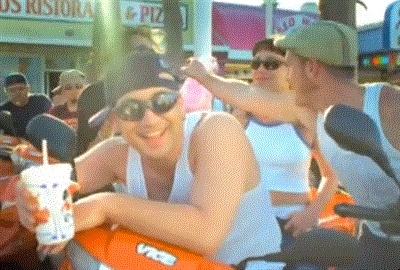One-hit wonders are meant to get stuck in time, to become confined to the year the artist and song hit their peaks. Occasionally, a rare gem transcends those borders; a track that finds legs outside of the charts and traditional musical means of measured success. For Canadian band Len, its 1999 single, “Steal My Sunshine,” remains its biggest hit in a 25-year career. But while the group has failed to chart with followup releases, the song continues to find a place in the cultural zeitgeist every year — not in the world of music, but instead on TV shows.
The song, which debuted on July 22, 1999, was written by Len’s Marc Constanzo after attending a rave north of his hometown Toronto. Upon returning from the festival, pseudo band member and friend Brendan Canning (now of Broken Social Scene) played a song by Andrea True Connection for Constanzo called “More, More, More,” the song that would later get sampled and used as the basis of Len’s hit, although that’s not exactly how Canning recalls it now.
“Marc credits me but to be honest I was doing a bit of drugs back then,” Canning told CBC Music. “Certain memories aren’t quite as clear.”
What Canning does remember is doing some “freestyle spoken word” on the track, which appears at the beginning of the song, and later on receiving $2,500 from Len’s label, Columbia Records, which he later used to buy pedals for him and Broken Social Scene cofounder Kevin Drew to record their band’s debut release, Feel Good Lost. Tangent aside, that’s how “Steal My Sunshine” was born.
“Steal My Sunshine” never topped the charts, but it did peak at number 3 in Canada, number 9 on the Billboard Hot 100 and in the top 10 on various other charts around the world. Its ubiquity between 1999 and 2000 made that Andrea True Connection sample — that animated pinging noise and the song’s airy melodic structure — an instantly recognizable earworm for many, and the song’s colourful California and Florida-shot video was on high rotation on both MTV and MuchMusic. (The video even took home three MuchMusic Video Awards in 1999 for best video, best pop video and favourite Canadian video.)
Los Angeles radio station KROQ gave it the coveted “song of the summer” title, an honour that Constanzo remembered fondly in an interview earlier this year with Stereogum. And really, let’s admit it: this truly is the song of every summer, a trusty staple that needs to be played as a declaration of summer beginning. But above all, beyond people’s correlation between the song’s bouncy beat and the summer sunshine vibes, “Steal My Sunshine” truly prevailed that year because it was simply a great pop song with an enduring hook.
Crawling out of the millennium proved to be tough for Len, whose followup single “Feelin’ Alright” failed to chart anywhere. “Steal My Sunshine” dropped off of people’s radars, fading into the sunset like a distant summer vacation memory. Len was soon forgotten by music fans, who moved on to other pop hits by Britney Spears, NSYNC and Christina Aguilera, but whether intentional or not, Len found a new medium for its music to flourish: film and TV.
“Feelin’ Alright” was featured on an episode of the MTV cult classic Daria (2000), while other songs of Len's were picked up in films like The Adventures of Rocky & Bullwinkle (2000) and The Hot Chick (2002). Len even covered Kim Wilde’s “Kids in America” for Digimon: The Movie, an animated cartoon that trended on the heels of Pokemon’s sudden popularity. In 2003, Len contributed another song, “People Come Together,” to the Steve Martin family comedy Cheaper By the Dozen and in 2008, “Steal My Sunshine” resurfaced in the Seth Rogen feature Zack and Miri Make a Porno. While most of these films and shows weren’t blockbuster hits, it was a lucrative way for Len to find a platform for its music elsewhere, not to mention a good paycheque.
Nine years after its release, “Steal My Sunshine” found new footing on the soundtracks of TV shows. Since Zack and Miri Make a Porno, the Len hit has appeared on four TV shows and one movie, this year’s Mother’s Day. While that may just look like a coincidence, there are great qualities to “Steal My Sunshine” that make it such an alluring soundtrack pick.
Take last year’s hit USA drama Mr. Robot for instance. In an early episode of the show’s first season, protagonist Elliot (Rami Malek), a socially inept hacker genius and morphine addict, slips into a brief moment of normalcy after dissolving (or so he believes) a hacker group called fsociety. In this sequence, we see Elliot temporarily bask in a blissful, burden-free moment as he contemplates living a hack-free life filled with Instagram hearts and Starbucks vanilla lattes. This montage is backed by the instrumentals of “Steal My Sunshine” but it’s never portrayed as all joy and, well, sunshine. Viewers understand that what Elliot is going through is temporary, that darkness looms around the corner for his character because if he actually went through with his plans then the show would effectively end. What makes this song such a poignant pick for the show and the scene is that the Len song itself is a mirror of that façade. While the song is happy and bright on the surface, it actually contains a dark undertone and lyrics that address drug use and depression. After all, “I know it’s done for me/ if you steal my sunshine” is not a very cheerful refrain.
Alternatively, “Steal My Sunshine” can also be used for comedic effect, such as its feature on a 2011 episode of the NBC comedy Parks and Recreation. In the episode titled “Camping,” Leslie Knope (Amy Poehler), the deputy director of the Pawnee City Department of Parks and Recreation, hits a creative wall when tasked to follow up the success of the Harvest Festival. Struggling to come up with more ideas now that she has the interest and capital to move forward with her department, Leslie takes her team on a camping trip where her stress escalates until, finally, we see her boil over with anxiety while listening to “Steal My Sunshine” on repeat. The punchline here lies less in the lyrical content or sonic soundscape of the song but more in its cultural significance. Len is widely known as a one-hit wonder, which is what Leslie is trying to avoid, which makes sulking to the Len tune drive home that fear even more.
The multidimensional utility of “Steal My Sunshine” has fortuitously revived Len in recent years, but even in the interim years it’s evident that Len has found a way of surviving its one-hit wonder syndrome by navigating a lane outside of the competitive music landscape. In the previously mentioned Stereogum interview, Costanza takes very little credit for the past 17 years of continued success for “Steal My Sunshine”: “The second that song blew up, it’s not my song anymore. I was a part of it, I was there. But the fact that it does what it does every year, you know, movies, commercials, whatever, has nothing to do with me. It has to do with the people that have a connection to it, you know? […] It feels like it has so much more power than me as just one individual.”


